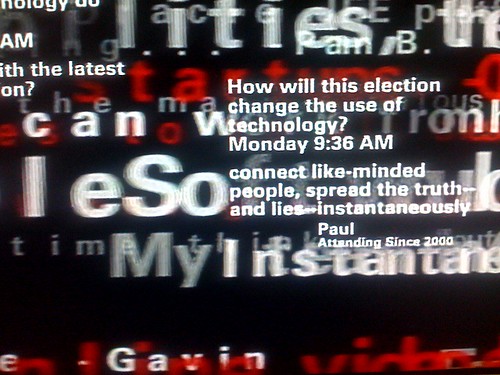As noted in my earlier post, spent the last two days up at Oracle OpenWorld, mainly focusing on how they were presenting their offerings that are being hung under the "Social CRM" banner.

First, the pragmatic bits. Oracle still has a long way to go to truly embrace the notion that the customer can be in control, or at least be a mutually beneficial party, in the business relationship. Exhibit A, the cringeworthy tag line and subhead on the page shown above. What does it say?
"Oracle Social CRM Applications leverage Web 2.0 technologies to help sales people identify qualified leads, develop effective sales campaigns and presentations, and collaborate with colleagues to close more deals quickly."
I don’t even know where to start with that messaging and the general wrong-way-rubbing that it induces. Perhaps the easiest thing to point out is that it’s still 100% focused on the sales team, and implicitly views the customer as the enemy, or at least simply the next transaction. One of the demos that was shown at the event last night illustrated how one of their new tools could make it easier to identify that sales opportunity that was looking like it was slipping into the next quarter’s business, and how it aided the sales manager in identifying it and enabled him to encourage the rep to do anything possible to bring the business in before the quarter ended. (N.B. Recall item #7 from the customer’s point of view: "I want to buy things on my schedule, not yours. I don’t care if it’s the end of your quarter.")
There were two bright spots, however. Number one was the communication that Oracle SVP Anthony Lye shared this morning. A few quotes and comments from this morning’s presentation, from the Twitter stream (listed newer-to-older):
-
kitson:
#oow08 #Lye "With Social CRM, the individual gets a benefit, the network gets a benefit, and the company gets a benefit."
-
kitson:
#oow08 #Lye "Maybe there are a few companies that live off their own successes–but that’s really a small percentage now."
- kitson: #oow08 #Lye "I don’t expect to sell this [Social CRM] to everyone."
-
ccarfi:
"the brands that DON’T try to control the conversation will do better than those that try to control it" #lye #oow08
-
ccarfi:
"if you have a bad product, it’s game over for a brand whether you like it or not" #lye #oow08
-
ccarfi:
"the internet gave the control the customer. web 2.0 gave the control to the community" #lye #oow08
-
kitson:
#oow08 #Lye "Fear is always a good thing, I think. Businesses don’t do anything unless they’re afraid [of the alternative]."
-
kitson:
#oow08 #Lye "Taking the best of the consumer Internet and enterprise data to leverage what’s already working with what Oracle can do."
-
ccarfi:
"CRM doesn’t have clue about conversation. Social Networks don’t have a clue about enterprise data." #lye #oow08
-
kitson:
#oow08 #Lye "The nicest compliment everyone pays me is how ‘un-Oracle’ Social CRM is."
-
ccarfi:
"conversation is very important. customers want to have conversations, and expect vendors to provide infrastructure for it" #lye #oow08
-
kitson:
#oow08 #Lye "Social networks can be public, they can be private, and they can be secret."
-
-
kitson:
#oow08 #Lye "What we’re doing in our Social CRM is we’re bringing in ERP data + CRM data–data sets you’d NEVER put on the public Internet.
-
kitson:
#oow08 #Lye
"Customers are choosing not2stay in line w/those relationships.They
want 2 converse & CRM systems have no idea what’s going on."
- kitson: #oow08 #Lye "CRM for the first 10 years was about data capture."
- kitson: #oow08 In a briefing with Anthony Lye of Oracle’s CRM…
So, it’s appears clear that Anthony Gets It with respect to what the right things to say are. Now, just to turn the Sayonara around to embrace the customer as relationship partner is the task at hand and exhibit that understanding via product, positioning and action.
The other bright spot was a proof-of-concept demo that was shown for customer The Body Shop. This was an iPhone application that started to inch down the path to giving more power to the customer, or at least include her in the relationship at some level. Here are a few quick shots from the keynote.
Here’s an entry-screen to the application, which a customer could bring up on her iPhone when she walked into the store. Behind the scenes, profile information on preferences and purchase history would be available.
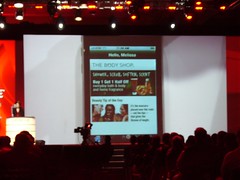
Oooh! Product! The sort of nifty thing here was access to ratings of this particular product both from the "at large" community, as well as the specific ratings from your "friends" and/or "people like you."
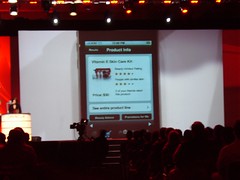
A hop over to a "loyalty card points" page, where points could be redeemed for discounts, etc.
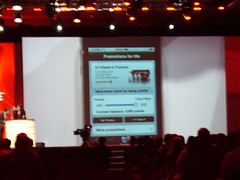
Choose from one of a bunch of options for the "loyalty" bonus: Redeem Now, Email/SMS to get Rebate, Share with a Friend, or Donate to Charity.
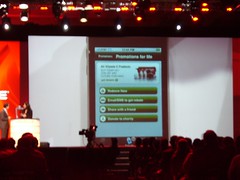
Ok, we chose "Redeem Now." Discount code is available, take the "coupon" to the register to save a few bucks at checkout.
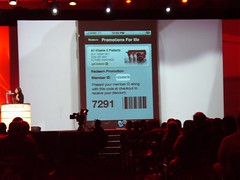
What I was NOT able to get were any details on how "real" the application is. The demonstration that was shown was very, very scripted, and quite a bit of the demo required the suspension of disbelief once you started to delve into the details. For example, the details around the explicit sharing of a lot of (really) personal data among "trusted" friends was assumed to "just work," with neither the social nor the technical nor the identity underpinnings given any level of discussion.
Another big thing to note: the access to purchase history and preferences and the like is wonderful, but the information still is 100% in the hands of the vendor. So, although some of the ideas feel a bit like VRM, the implementation still needs to take the big leap – let the customer control, edit, change, and manage her own data. That part is still most definitely not there. We still have the silo problem – if you had one of these apps for The Body Shop, and one for the movie theater, and one for the restaurant down the street, we’d still have the Tower of Babel problem we have today. Of course, it would just be a shinier Tower of Babel, since it’s on the iPhone.
But…it’s a start. Where we are now with the enterprise and how it will connect with customers feels a lot like where Big Media (and in particular the newspaper industry) was in about 2004-2005. Technically, the tools are in place, or soon will be. The real challenge is NOT a technical one. It’s a social challenge. It’s a humbling, or perhaps a realization, of the marketers and sales people in large companies that, no, they really are *not* in control of the "message," whatever that is. Thoughts around this were written in 2004, and before that in 2000. Those things still hold true, and it boils down to this:
The customer really is in going to be in control. Deal with it.






